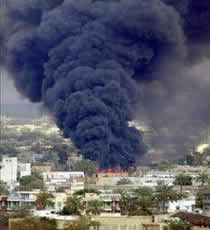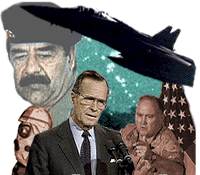On this page there are case studies of particular conflicts: Libya, Iraq and the Gulf War. You should also think about issues raised by war, including pacifism, Genocide, nuclear weapons (e.g. Hiroshima), indiscriminate weapons (e.g. landmines) and other issues. The following may be helpful:
- Issues raised by war
- Ethical responses to issues raised by war (and a blank for students to fill in)
Libya
In February 2011, the Libyan government responded violently to pro-democracy demonstrations, and hundreds were killed. This led to a full-scale revolt and civil war in Libya, a large North African country which was run by Colonel Gaddafi. The UN Security Council passed a resolution to freeze Gaddafi's assets later that same month. Gaddafi'sson warned that if protests continued there would be 'rivers of blood'. Gaddafi had reportedly armed militiamen to kill protestors. The UN Human Rights Council condemned Gaddafi's actions and expelled Libya outright. The UN Security Council passed a further resolution in March (with a 10-0 vote and five abstentions) to allow member states to establish a no-fly zone over Libya to prevent Gaddafi bombing his own cities. The resolution allowed member states to use "all necessary measures" to prevent civilians being killed. Gaddafi declared a cease-fire, but did not keep to it.
France was the first country to attack Libya, destroying 5 of Gaddafi's tanks on 19 March 2011. America and the UK launched attacks on 20 integrated air defense systemsusing over 100 Tomahawk cruise missiles. In June 2011 the International Criminal Court issued an arrest warrant for Gaddafi for planning and implementing "a policy of widespread and systematic attacks against civilians and demonstrators and dissidents". In October 2011, Gaddafi's convoy was hit by NATO forces. There is some controversy about what happened next - Gaddafi was beaten by NTC soldiers (the National Transitional Council set up by rebels and recognised by many other countries). He may have been shot and/or stabbed, then he died. It is estimated that in excess of 30,000 Libyans died in the civil war.
President Obama emphasised that he was not taking sides in a civil war, and that military intervention was purely to protect the people of Libya.
 The Iraq War
The Iraq War
As yet (2012) there is no agreed terminology to differentiate between the Iran-Iraq war, the Gulf War of 1990/1 and the Iraq War (2003-2011). In between the two conflicts, sanctions and no-fly zones were established. Oxfam, an independent charity, estimates that 300,000 Iraqis lost their lives during this time due to sanctions.
The terror attacks of 2001 (universally known as 9/11) are seen by some as the reason George W. Bush took a greater interest in Iraq, calling for an end to production of 'weapons of mass destruction' in 2002. UN weapons inspectors entered Iraq, but found no compelling proof of the existence of weapons of mass destruction.
In the UK, Tony Blair took pains to explain why he felt that it was necessary to go to war. A major factor in the support that many gave the government (although the government was not united on this) was the claim that Iraq could deploy weapons of mass destruction in 45 minutes. This claim was later found to have been based on unreliable intelligence. Tony Blair has since focussed on the importance of removing Saddam Hussein from power.
In 2002, America formed a 'coalition of the willing' and, before weapons inspectors could finalise their work, they attacked in March 2003. In 2004, Kofi Anan said that the resolution to go to war was contrary to the UN Charter and illegal.
One of the most useful activities for an A level student would be to look at the Iraq War and ask which of the Just War Criteria were met. Remember they should all have been met for the war to be justified. You should list arguments for and against for each criterion.
The decision to go to war has been heavily criticised by many (although Bush was re-elected in 2004 as was Blair in 2005). There have also been many examples of activities that contravene 'jus in bello'. The most notorious example is the treatment of prisoners in Abu Ghraib, where Iraqi prisoners were beaten, tortured, abused and humiliated. Critics claim that the way the war has been fought has resulted in numerous un-necessary deaths. Others call for a swift withdrawal of troops. Bush and Blair have claimed that the troops are necessary to support the democratically elected government (the permanent government took power in May 2006).
The Gulf War
The Gulf War began in August 1990 when Iraq invaded Kuwait. Operation Desert Storm commenced on 17th January 2001, lasting little more than a month and ending with victory for the US and her allies.
At the time, the severity of the air attacks, particularly on Baghdad, was criticised. Baghdad was hit over a thousand times on the first day of hostilities. Aerial attacks are by their very nature indiscriminate, and a significant number of Iraqi civilians lost their lives - an estimated 2,300 in total. 147 American troops died, although a quarter of these were killed in 'friendly fire'. There were also reports of 'Gulf War Syndrome', which some believe was caused by chemicals in the weapons used. The cost of the war was estimated at around £40 billion.
The justification for going to war was to defend the sovereign nation of Kuwait. However, many people believe that the motive had much more to do with America's oil supply.


